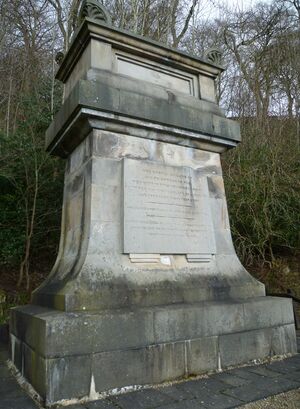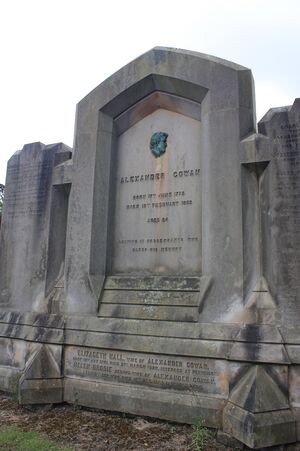Contents |
Biography
Papermaking Career
Alexander Cowan was a Scottish papermaker. He studied physics and chemistry in Edinburgh, and decided to improve the process of paper-making, setting up what was then one of the world's largest mills
Philonthropic Works
Alexander Cowan was a philontrapist. He was said to have distributed over half of his earnings to the poor. Some of his works include funding the reglazing of every window on the Royal Mile in Edinburgh. He set up a public library in Penicuik, one of the first free libraries in Britain. In 1832 during the cholera epidemic in Edinburgh, Cowan is said to have sat with victims on the Canongate to comfort them.

|
| The Valleyfield Monument |
During the Napoleonic Wars, Penicuik had three separate camps for French prisoners of war between 1803 and 1814. As a result, in 1810 the government commandeered Cowan's mills at Valleyfield for use as a prison for captured sailors and "kidnapped foreign civilians". The Cowan house was used as a prison hospital. During this time the buildings were expanded by the architect Robert Reid. Meanwhile Cowan continued paper-making on the River Esk at Melville Mill. Although the government had purchased his mills, he was able to renegotiate their purchase after the war, because he had retained the water supply rights that were critical to their operation as mills. Paper manufacture resumed in 1820. The two Robert Reid buildings were expanded and converted to residential use for the large Cowan family. It was named Valleyfield House. Afterwards, around 1830, Cowan commissioned Thomas Hamilton to design a memorial to the memory of the 309 prisoners who died there, erected on a mound near Valleyfield. The monument bears the inscription "All Men Are Brethren".
Family Life
Alexander Cowan was born 17 June 1775 in Penicuik, Midlothian, Scotland. He was baptized the next day. He was the 13th child (of 14) of Charles Cowan and Margorie Fiddler.
On 31 May 1800 he married his cousin Elizabeth Hall in Edinburgh. Together they had 11 children. Elizabeth died 21 March 1829. Eight of these children survived to adulthood.

|
| Alexander Cowan Older Family |
On 14 Aug 1830 he married Helen Brodie in Canongate. Together they had 9 children.
He died on 13 February 1859 at the age of 83. He was buried on the 15 February in the Grange Cemetary in Edinburgh.

|
| Alexander Cowan Gravestone |
In his will, he left money to build the cowan institute.

|
| The Cowan Institute |
Sources
- Wikipedia Page https://en.wikipedia.org/wiki/Alexander_Cowan
- https://web.archive.org/web/20140718080105/http://www.kosmoid.net/lives/cowan
- https://artuk.org/discover/artworks/alexander-cowan-17751859-paper-maker-and-philanthropist-213226
- https://www.familysearch.org/library/books/records/item/419176-supplement-to-alexander-cowan-of-moray-house-and-valleyfield-founder-of-a-cowan-sons-his-kinsfolk-and-connections?viewer=1&offset=0#page=1&viewer=picture&o=info&n=0&q=
- https://archive.org/details/remainsofalexand00cowa
- https://archive.org/details/archibaldconsta01consgoog/page/n514/mode/2up
See Also
- "Family Tree," database, FamilySearch (http://familysearch.org : modified 29 April 2020, 00:06), entry for Alexander Cowan(PID https://familysearch.org/ark:/61903/4:1:KPHR-J12); contributed by various users.
- Source: S165 Type: Web Site Author: Roger --- Title: Alexander Cowan URL: http://wc.rootsweb.ancestry.com/cgi-bin/igm.cgi?op=GET&db=kosmoid&id=I3317 Date: 2002 Source Detail: A very full biography of Alexander Cowan Data Changed: Date: 17 OCT 2014
- https://www.findagrave.com/memorial/145178754 Find a Grave
- https://www.researchgate.net/figure/Alexander-Cowan-was-owner-of-papermaking-factory-at-Penicuik-and-had-13-children-Boys_fig3_282975193
- https://books.google.com/books?id=5qDonAAACAAJ&newbks=0&sitesec=buy&source=gbs_atb
- https://www.gengophers.com/book.html#/book/67025?page=297&given=Alexander&surname=Cowan
- https://www.wikitree.com/wiki/Space:Old_Moray_House
- https://en.wikipedia.org/wiki/Penicuik
- http://www.penicuikpapermaking.org/where.html
It may be possible to confirm family relationships with Alexander by comparing test results with other carriers of his Y-chromosome or his mother's mitochondrial DNA. However, there are no known yDNA or mtDNA test-takers in his direct paternal or maternal line. It is likely that these autosomal DNA test-takers will share some percentage of DNA with Alexander:
-
~1.56%
Greg Webber
 :
23andMe, yourDNAportal GREee4c409a
+
AncestryDNA, Ancestry member gregwebber64
:
23andMe, yourDNAportal GREee4c409a
+
AncestryDNA, Ancestry member gregwebber64
Have you taken a DNA test? If so, login to add it. If not, see our friends at Ancestry DNA.
Featured National Park champion connections: Alexander is 15 degrees from Theodore Roosevelt, 16 degrees from Stephanus Johannes Paulus Kruger, 19 degrees from George Catlin, 18 degrees from Marjory Douglas, 26 degrees from Sueko Embrey, 14 degrees from George Grinnell, 19 degrees from Anton Kröller, 19 degrees from Stephen Mather, 15 degrees from Kara McKean, 20 degrees from John Muir, 10 degrees from Victoria Hanover and 27 degrees from Charles Young on our single family tree. Login to find your connection.





